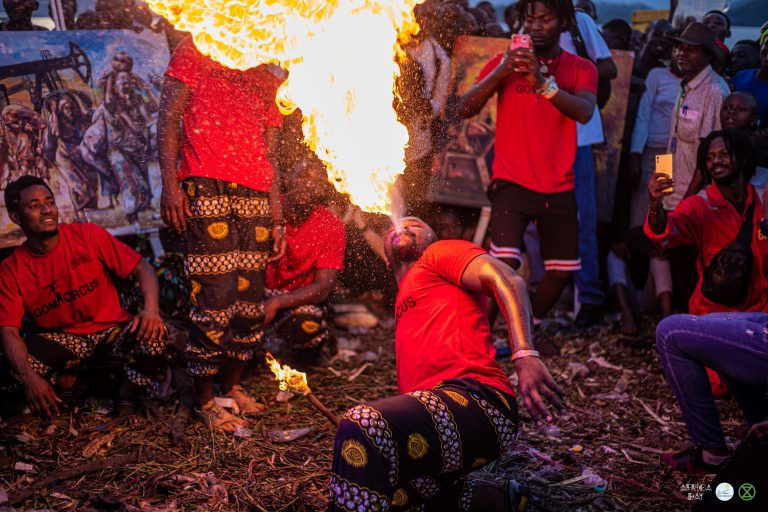A new campaign is mobilizing communities across the Democratic Republic of Congo to stop the fossil fuel industry’s expansion with creative nonviolent action.

Rebels launch the Pétrole Non Merci campaign at Kituku market in Goma, DRC
Student activists are traveling thousands of miles across the Democratic Republic of Congo to mobilize communities against the expansion of Big Oil.
Pétrole Non Merci, or Petrol No Thanks, is a national campaign to oppose the proposed sale of 27 oil blocks and three gas blocks, most of which overlap protected areas. Anglo-French oil company Perenco recently bid to buy the new blocks and would export the oil using the EACOP pipeline.
The campaign has a two-pronged strategy. First, they are mobilizing communities where the new oil blocks are located to build local power and hold officials accountable. Second, they are linking up with communities like Moanda, which have already been exploited and abused by Perenco for decades.
The traveling activists are building a self-organizing network to take nonviolent action throughout the DRC, with coordinated popular uprisings.
I spoke with Pascal Mirindi, a student at the University of Goma who is involved with Extinction Rebellion and LUCHA, a Congolese citizens’ movement, about the campaign and their recent creative actions.
This interview is co-published by ZNetwork.org and the International Peace Research Association via WagingNonviolence.
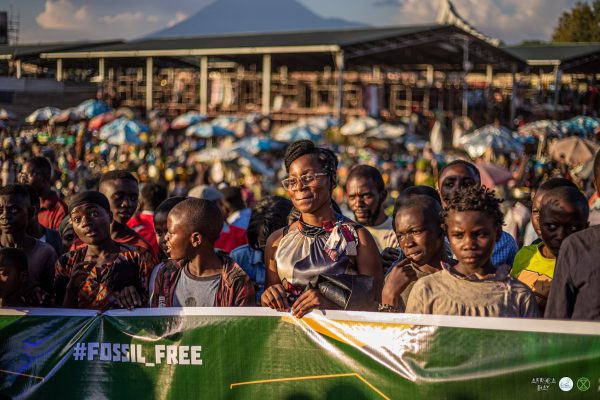
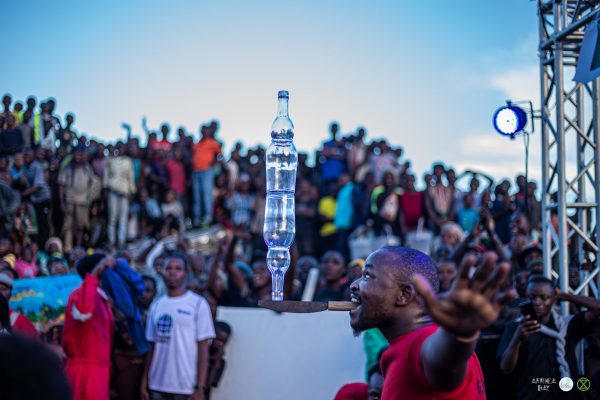
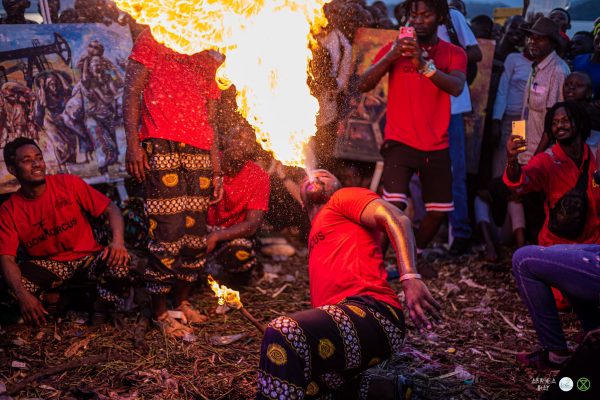
Activists hold a rally of art and performance to launch a campaign that will mobilize resistance to oil extraction in DRC.
Could you tell us about the Pétrole Non Merci campaign and Extinction Rebellion at the University of Goma?
XR University of Goma is a group of Extinction Rebellion located in the eastern part of the DRC. It was created around 2020 by students and a smaller group of academics from the University of Goma.
XR University of Goma has led many efforts ranging from the mobilization of local communities on the protection of the environment, to the protection of the Virunga National Park via the Fossil Free Virunga campaign, and efforts to hold the park’s management accountable to its mandate and to local communities. Now, we have launched the Pétrole Non Merci campaign to oppose the proposed sale of 27 oil blocks and three gas blocks, most of which overlap protected areas such as Virunga National Park, coastal mangroves and peat bogs in the equatorial forest of the Congo Basin.
The idea of the campaign is initially to mobilize local communities where the oil blocks are located. We believe that only if we manage to build informed and empowered local communities, will it be possible to hold the ruling class accountable.
We have so far installed the groups of XR Rutshuru, XR Moanda and XR Bunia and we intend to install many more. Of course, the Congo is very large. It takes us a lot of time, but we are sure that we will get there, based on our growing momentum so far.
After having mobilized the population on the disadvantages of the fossil fuel industries on social, economic, political and environmental levels, and continuing educational exchanges on how to claim our rights through nonviolence, we plan to take action throughout the DRC. We will continue to organize coordinated popular uprising actions to say NO to the Machiavellian plans of our leaders who still want to defraud humanity at the expense of their selfish interests.

XR University of Goma travel 6,000 km for the formation of XR Moanda.
You and other organizers of Pétrole Non Merci recently traveled over 3,700 miles to connect with the people of Moanda on the opposite side of the DRC. Could you talk about this journey and about what happened there?
Moanda is located on the west side of the DRC; it is the only maritime community in the country. Geological and geophysical work undertaken there between 1959 and 1982 led to the discovery of five oil fields. The intense research activity resulted in the identification of seven fields in 1976. At the end of 2012, the number of wells was estimated to be 235 according to official researchers. However, that number is contested by the local population who can show 800 wells.
Moanda is the only place in the DRC where oil is exploited. From the start of this campaign, we wanted to see for ourselves what oil exploitation would look like for communities if, once again, we add more blocks in the DRC. More specifically, we wanted to see how oil exploitation had been done by Perenco, because Perenco had just bid to buy other oil blocks.
From our arrival in Moanda, we were surprised to see that the Perenco offices were set up within a military camp. It has been impossible for the community to approach them. They are in their corner and the population is in their corner.
Moanda remains one the world’s poorest communities. Ninety-five percent of the local population and villages such as Kinkanzi, Sia Nfula, Kintombe and Kindofula are unemployed, despite the oil exploitation that has been taking place in their midst since the late 1960s.
Since the 2000s, Perenco has not managed to do anything to mitigate damage, let alone to share the profits of extraction with the community. No schools, no hospitals, no roads and not even the distribution of damage. There are oil flares behind the homes of the population. On our visit, we learned that there was a little girl who lost her life by oil flare when she was playing behind her house. She died on fire.
The production of agriculture has diminished, there is increased seasonal disturbance, the coconut palms at the edge of the river are dying off.
Nothing in terms of dialogue is done by the leaders or even the local managers of Perenco.
In short, it is because of all this, that the people of Moanda have agreed to accompany us in this battle. So together we will block the road to the fossil industry, starting with Perenco, which our political leaders try to falsely show as a positive example of oil exploitation. Through our collective participation in Pétrole Non Merci, we will ensure that the truth of Moanda’s experience is known throughout the DRC and we can resist this exploitation in unison.
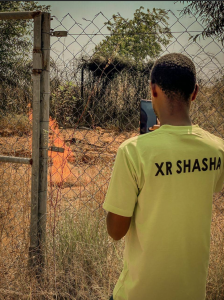
Perenco oil wells and torches less than 10m from dwellings and roads in Moanda, DRC.

You and your fellow organizers have also traveled to many communities who will be affected by the sale of the new oil blocks. Would you tell us about the trip to Bunia and the founding of XR Bunia?
In Bunia and the communities around Lake Albert, we held exchanges with students from universities and other educational institutions about the Pétrole Non Merci campaign. The campaign not only aims to force the Congolese government to abandon the auction of these additional 27 oil blocks, but also to force the government not to link oil block 3 (near Lake Albert) with Uganda’s EACOP pipeline, which is managed by the company Total Energies.
In Bunia and the wider province of Ituri, the debate has focused much more on the negative impact of oil exploitation on fishing, which is the main livelihood of tens of thousands of Congolese people around Lake Albert. In addition to destructive impacts on the ecology of the lake, the familiar impacts experienced by Moanda are also of concern — oil flares, bad air quality, acid rains, soil contamination, etc.
After more than two hours of exchanges and debates, the young people of Bunia decided to create a framework for exchange and organizing between themselves to continue after our departure, and thus created a local Extinction Rebellion group called XR Bunia.
After Bunia, we traveled 60 km on a dirt road to two more villages bordering Lake Albert, Kasenyi and Tchomia to seek further community exchanges. We spoke with a member of local civil society who had visited the Niger Delta in the past to understand the disaster of the oil exploitation project in Nigeria. We encouraged him to organize several sessions to explain to the whole local community the negative impact of fossil fuels.
We met with the fishermen of Lake Albert and discussed the negative impact of oil on the lake ecology and on climate change. The civil society of Tchomia has expressed their intention to establish their own local XR group. We are continuing to work to support them in their organizing.

Say Something – XR activists mobilize communities around Lake Kivu, Democratic Republic of Congo
In addition to setting up networks of local self-organizing groups, Pétrole Non Merci has organized some spectacular public demonstrations featuring art and performance. Could you talk about the event in the Kituku Market?
After the Kalehe flood in South Kivu this past May, we decided to organize a demonstration in the Kituku Market, the largest coastal market in the city of Goma. Many hundreds of people lost their lives in the flood, thousands went missing, thousands of houses were destroyed — around 50,000 people were affected in the flood zone without food, clean water, shelter or roads. We took up this moment to launch the Pétrole Non Merci campaign in order to highlight that we are already suffering the effects of climate catastrophes and that this suffering will only increase if we do not stop the fossil fuel industry’s expansion.
We can use artistic demonstrations to mobilize the population by connecting the negative effects of global warming, like floods and seasonal disturbance, to fossil fuels. It is easy for people to think that the effects of global warming can never attack Central Africa, including the DRC. No one ever thinks it will happen to them until an event like a major flood occurs in your community.
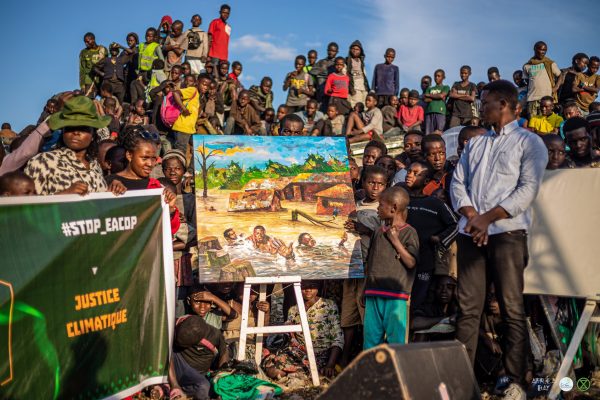
Pétrole Non Merci launch rally at Kituku Market – creating and sharing art to confront climate crises and mobilize communities
That’s why we used art: We made paintings, dances and other performances to get people’s attention, to get the message across, and to involve people in joining through their own expression. This has been an effective way to deeply impact and mobilize people, turning denial and grief into collective action.
Pétrole Non Merci, XR University of Goma, and our network of allies will continue our work mobilizing communities and empowering them through learning about climate change and about nonviolent resistance. This is just the beginning for us, building our power to say NO.

Pétrole Non Merci launch rally at Kituku Market – creating and sharing art to confront climate crises and mobilize communities
Follow the Pétrole Non Merci campaign on Facebook and Instagram.


